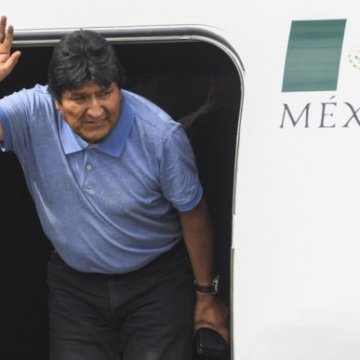- About
- Topics
- Picks
- Audio
- Story
- In-Depth
- Opinion
- News
- Donate
- Signup for our newsletterOur Editors' Best Picks.Send
Read, Debate: Engage.
| topic: | Human Rights |
|---|---|
| located: | Mexico, Bolivia |
| editor: | Magdalena Rojo |
Bolivia is going through times of protests and demonstrations, accompanied by turbulent changes at the political scene that have left the country polarised. And it's not only politicians from around the world who cannot agree on whether what happened in Bolivia two weeks ago was a coup or not.
The situation in the South American country turned violent after the elections on October 20, in which Evo Morales once again won the presidency. He refused declarations by the Organization of American States that the elections were manipulated, which the statistical analysis of the electoral returns and tally sheets by the Center for Economic and Policy Research did not confirm. However, under military pressure, Morales was forced to resign and leave the country. Mexico offered him political asylum.
Only a day after Morales boarded the plane, the deputy leader of the Senate, Jeanine Áñez, proclaimed herself an interim president after the Senate session was boycotted by Morales' party. The Constitutional Court of Bolivia endorsed her as a leader of the country.
Áñez is known as a right-wing, conservative Catholic who in the past posted a few Tweets and Facebook posts disrespectful towards the indigenous population. She held the Bible in her hands when she assumed office, even though Morales prohibited the Holy book in the presidential palace, recognizing the Andean earth deity Pachamama within the Constitutional reform.
Morales has been critical towards the Roman Catholic religion, blaming it for the killings of the native population during the colonial era. He was the first indigenous president elected in Bolivia and during 14 years of his presidency, the life of the indigenous population has improved; there has a been a substantial reduction of poverty, life expectancy has increased, as well as education attendance.
The president of the indigenous origin and its government are for now replaced by its opposition, which has no indigenous representatives in a country with over 40 % of indigenous population.
Since October 20 when the elections took place, there have been over 30 deaths due to the violent clashes between indigenous supporters of Morales and the security forces firing volleys of tear gas. Hundreds of people were injured and detained. Human Rights Watch warns that since Jeanine Áñez assumed office as interim president, the government has adopted alarming measures that run counter to fundamental human rights standards.
José Miguel Vivanco, America's director at Human Rights Watch, has expressed concerns that the current Bolivian authorities "appear to prioritize brutally cracking down on opponents and critics and give the armed forces a blank check to commit abuses instead of working to restore the rule of law in the country". The international organisation points at the harassment of government opponents and journalists.
The polarization of opinions is present on a global scale. The US president, Donald Trump, the UK government, as well as the Brazilian president, Jair Bolsonaro, expressed their support for Áñez and her establishing peace in Bolivia. On the other hand, US congresswoman Alexandria Ocasio-Cortez, British opposition leader Jeremy Corbyn, US senator Bernie Sanders and Russia also call the situation around Morales a coup.
There is an international pressure to announce the date for the new elections and Áñez has already confirmed that she would do so in order to have a new president elected by January 22, when Morales' current term officially ends.
Will Bolivia become another country on the world map with a right-wing leader or will the choice of the majority of Bolivians be respected this time?
